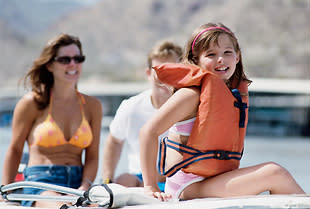 Shine On
Shine OnSummer safety tips

The chill of winter seems but a distant memory now that sunnier days are in the forecast, and with the nice weather comes outdoor activities like grilling, camping and spending time on the water.
While the official start of summer is still a month away, the Victoria Day long weekend (or May 2-4 as it's commonly known) traditionally marks the unofficial start to summer for many Canadians.
To help Canadians stay safe all summer long, the Canadian Standards Association (CSA) Group has released several safety tips to keep in mind to help prolong your summer fun.
Gas grills and barbecues
Make a clean start. Before firing up the grill for the first time this season, carefully inspect burners and burner tubes for blockages due to dirt, grease, insects or rust build-up. Clean or replace any blocked parts or have a certified technician make repairs.
Blowing bubbles. To make sure there are no gas leaks, rub a 50/50 solution of soap and water onto the gas hose, fittings and connections and turn the gas on at the tank but not the burners. Any leaks will produce bubbles. Tighten the fittings if required and replace any damaged hoses or fittings.
Take a pass on old gas. Propane cylinders must be inspected and requalified every 10 years in Canada and 12 years in the US. A date stamp on the cylinder indicates when it was last qualified. Do not use a rusty or damaged cylinder. If in doubt, have your tank replaced.
Breathing fire. Keep grills and barbecues away from combustible materials such as fences, trees, buildings, awnings and carports. Never use a barbecue in a garage.
Buy the Certification Flame. When purchasing or installing a gas barbecue, make sure that it carries the mark of an accredited certification agency such as the CSA Group Certification Flame or Star Mark indicating that it meets applicable national standards.
[See also: Don't get ill from your grill]
Camping stoves and lanterns
Three meters from the tent. Fuel-burning camping equipment such as stoves, lanterns and outdoor cookers should only be lighted outdoors and at least three meters from tents, combustible materials and vehicles. Never light a stove or lantern indoors or in a tent or vehicle. Before use, carefully inspect parts for leaks, blockages or damage.
Free the flame. To prevent carbon monoxide poisoning, fuel-burning equipment should only be used in well-ventilated areas.
Hot is not cool. Keep loose, flammable clothing away from open flames and carefully monitor children and pets around stoves and lanterns. Before packing up equipment, make sure it is completely turned off and cool to the touch.
Boats and cottages
Boat smarts. Always wear a personal flotation device and never consume alcohol or intoxicants while operating a vehicle.
Be alarmed. Ensure that certified carbon monoxide and smoke alarms are tested and properly installed outside all sleeping areas of your cabin, cottage or boat.
Pest check. When opening your cabin, cottage or rustic retreat for the season, carefully inspect all appliances for damage from rodents or insects.
Be prepared. Ensure boats and cottages are equipped with proper safety equipment in the event of an emergency, including first aid kits and fire extinguishers.
Learn how to grill the perfect steak just in time for summer in the video below.
More from Shine on Yahoo! Canada
Tips for starting a vegetable garden
Expert tips for a weed-free lawn
Gardening mistakes to avoid


